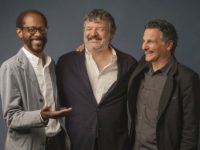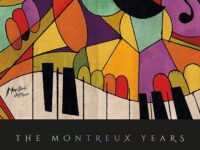Greatness begets greatness. That is almost universally true in jazz, where so many of the best players of a generation got their start playing for the best players of a prior generation. Miles Davis is one the best examples of a major figure to whom many other major figures owe their success and reputation to. Chick Corea is another. Never mind the guitarists (Al Di Meloa, Frank Gambale) or drummers (Lenny White, Dave Weckl) who first got wide notice from playing in Corea’s bands, the bass players seem to be the most successful of the lot. Stanley Clarke and Avishai Cohen have occupied this space for their most recent in a long string of accomplishments. Miroslav Vitous will get his turn here, soon. But today, it’s time to examine the latest from former Chick Corea Elektric/Akoustic Band member John Patitucci.
Since Patitucci’s regular stints with Corea ended in the early ’90’s he’s put out some acclaimed solo records and became a first-call session bass player, appearing on records by artists ranging from Natalie Cole and Mariah Carey to Gary Burton and Roy Haynes. His versatility and transparent tone is the reason he has been in such high demand.
With this his thirteenth album, Patitucci has by this time employed a wide array of formats and themes for his records. Remembrance uses some simple concepts borne out of possibly his most ambitious record Communion from 2001. He got together with Joe Lovano and Brian Blade for rehearsal sessions, and when the pianist didn’t show up, the three jammed as a trio. They loved the feel that they got from playing without the piano so much that the three resolved to record an album in this setting. That opportunity finally arose some seven years later. But there’s another theme involved with these sessions, too, and that is the theme of tribute. Patitucci wrote all eleven tracks with nearly all of them a salute to jazz inspirations who are no longer with us, such as John Coltrane, Alice Coltrane, Elvin Jones, Ray Brown and Michael Brecker. He also tips his hats to the old vets who are still around like Sonny Rollins and former boss Chick Corea.
When Patitucci, Lovano and Blade entered the studio to record these tracks, they did so like the old timers did: in the same room without any headphones. Considering how well that worked in bringing out the rapport and personal connection between these players, you wonder why it isn’t often done that way anymore, with jazz, at least. “Monk/Trane” has that vibe down like Ray Brown; the bassist leads the way in a blues-based song that walks in natural crooked path instead of a straight rigid one. Lovano picks up the queues and paints a portrait in economy, playing only the notes that count. Later on, Lovano gets more emotional in the soulful style that is his signature. Blade stays in the background but recognizes that his role in creating the right timbres and percussion textures is more important than the timekeeping for this song. Patitucci himself shows a deep understanding of old school bass, his soling following right in the footsteps of guys like Brown and Pettiford.
“Monk/Trane” is a leisurely-paced tune, but “Messaien’s Gumbo” gets a little more busy. Using his six-string electric bass, Petitucci plucks a groove seemingly from gut feel and Blade locks into it with an array of funky accoutrements from his drum kit. Lovano carefully picks his spots when to jump in, not wanting to disrupt this groove, but when he commits, he commits fully. “Sonny Side” is another acoustic bass-led trio blues walk exercise, but Lovano plays more upbeat notes, and the structure of the song is better defined, but still played nice and loose. The Hubbard salute “Blues For Freddie” is another no-nonsense 12-bar blues, but this time, Blade stretches out more and tops off the tune with a rolling solo.
Patitucci returns again to his six-string bass for the somber and moody “Meditations” but plays it more like a guitar that’s been tuned low. For “Scenes From An Opera” the trio is joined by Patitucci’s wife Sachi on cello, as John himself plays acoustic bass and arco bass, and Lovano switches over to alto clarinet. Even with the classical instrumentation inserted into it, this is the most adventurous, probing track of the album.
The next three songs are sketches of temperaments moreso than fully formed songs. “Safari” is slowed-paced and introspective; “Joe Hen” is a little restive and avant garde; “Play Ball” softens the mood again and contains an extended, expertly-played acoustic bass solo by Patitucci smack dab in the middle of it. The album ends with Patitucci alone, overdubbing a pretty, 6-string electric piccolo bass on top of his regular 6-six electric bass. Although it runs less than two minutes, “Remembrance” makes a lasting impression as a tender tribute to Michael Brecker.
The easygoing mood of these sessions might belie the fact that they were made in reverence to some sacred names in jazz, but Rememberance captures the freewheeling attitude of jazz that these forefathers flourished in. That’s the central point of this record that John Patitucci was reminded of when he and his two compadres were forced to rehearse one day without a piano player.
Rememberance, from Concord Jazz, went on sale August 4.




